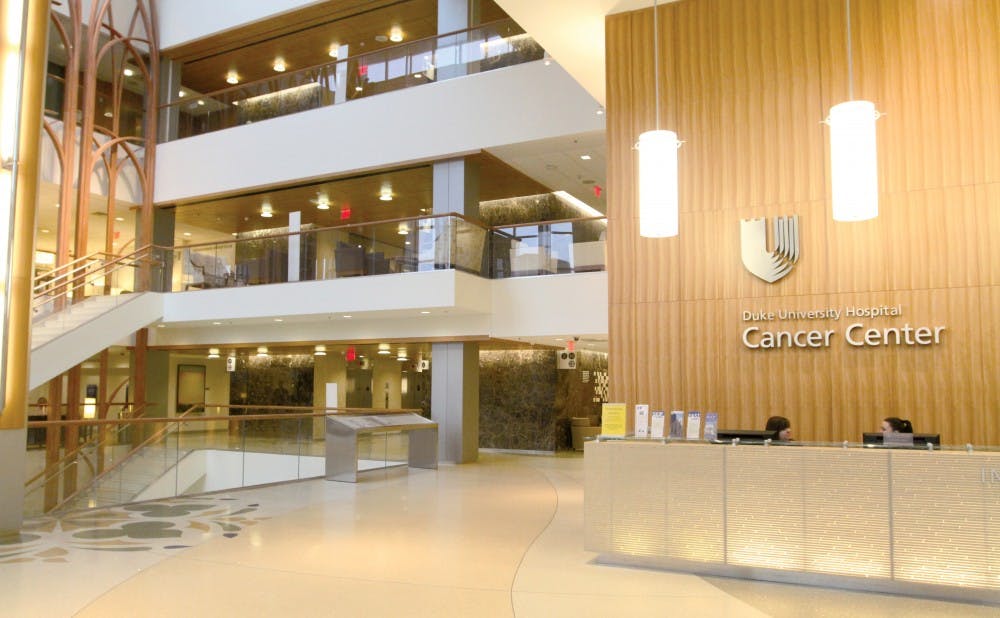Some student volunteers are concerned that training does not cut it at the Duke Cancer Institute.
The volunteer program at the Institute, called the Duke Cancer Patient Support Program, began 26 years ago and has grown to a network of 250 to 300 volunteers. Thirty percent are students from universities across North Carolina.
Phillip Shoe, volunteer coordinator of the DCPSP, said training is satisfactory. Many students, however, believe that training for such a large volunteering program should cover more areas and be more specific, particularly in terms of bedside manner.
Lloyd Zhao, a junior who has been volunteering for two years, said that training tends to skim over certain social situations that may arise from being around grieving cancer patients.
“I remember a time when one of the cancer patients, who was in a bad mood, basically asked me to tell some people near her to move because they were being too happy,” Zhao said. “Training certainly doesn’t cover situations like these. You need to use common sense in order to judge these kinds of situations, and training really lacks in this way.”
Trainings usually include privacy or bedside manners training, and outline different situations that a volunteer could encounter in the hospital setting, Shoe said, adding that training is tailored as specifically as possible to the tasks of the volunteers.
“Each volunteer, whether a student or a member of the community, goes through an initial five-hour training,” Shoe said. “After that, training is specialized based on what is needed from the volunteer. Some positions include anywhere from one-and-a-half to eight-hour additional training, because they either require extremely close encounters with patients or require many tasks at once from volunteers.”
Zhao also said their training left out many logistical details, such as locations of items and specific places in the Cancer Center.
“I am a host volunteer, and sometimes I wouldn’t know where to direct patients and their families,” he said. “Sometimes I’d even have to ask nurses for the location of everyday items, such as blankets or snack items. These are simple things that training should go through.”
Junior James Tian, also a volunteer of two years, said the format of the training could be much more interactive.
“Nearly all of the training is in PowerPoint format,” Tian said. “It’d be much more helpful if they made us practice what we learned, maybe in pairs. That would be the best way, in my opinion, to teach us how to navigate patient requests in a professional way.
Sherry Tang, a junior, said she is satisfied with the training, but noted that it is important to experience certain situations first-hand to really learn.
“The training is good information, but that information is solidified only through experience,” Tang said. “Volunteers shouldn’t be afraid to make mistakes, because through mistakes comes knowledge, and the staff and senior volunteers are always present as a good support system.”
Tang has worked in many different positions within the DCPSP, including the Look Good...Feel Better Program, and thinks that training for each is efficient.
“There’s just so much information to consolidate into a day of training,” she said. “Training obviously cannot cover every single situation for every single program, but the way they have training for specific programs makes it easier to learn the information for your own role within the Cancer Center.”
Vignesh Vudatha, a junior, agreed that training can only cover so much of the full experience.
“With any type of HIPPA or safety training, including the training at the Cancer Center, there has to be room for interpretation,” he said. “You need to go through the motions of volunteering before you truly understand what the training is all about.”
Regardless of opinions on training, the volunteers are an integral part of the Cancer Center foundation, and many patients look forward to their interactions with the volunteers, Tang said.
“Volunteers are unique in that they get to be as personal as they want with the patients,” Tang said. “Staff workers are the professional aspect of the Cancer Center, while the volunteers get to interact with patients in new and unique ways.”
Get The Chronicle straight to your inbox
Signup for our weekly newsletter. Cancel at any time.

